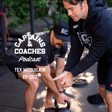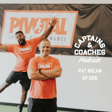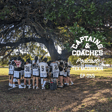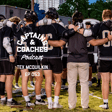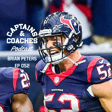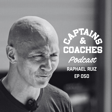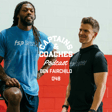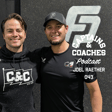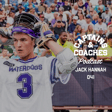Leadership Challenges and UTSA Introduction
00:00:00
Speaker
You can't take everybody with you at every every you know in every chapter of of the book that you're writing. And so you have to be OK with that. And that's the burden of leadership. I mean, it's not if you're going to be a leader, it's not are you going to have a burden to carry? It's how you're going to carry it, period. Like it's going to happen. Like Philo said, it's not a leadership.
00:00:17
Speaker
It's not a popularity contest. It's hard. It's hard to do the right things, but if you're making others around you ah better, I think that's a true leadership. And what we've tried to do here, not try, what we've done here is to create opportunities for guys to step up, period.
00:00:34
Speaker
Welcome to the Captains and Coaches podcast we explore the art and science of leadership through the lens of athletics and beyond. I'm your host Tex McQuilkin and today we travel to the 210 Triangle of Toughness in San Antonio, Texas as we observe the weight room culture that's powering UTSA football success. We're joined by Ryan Filo, the Assistant Athletics Director for Sports Performance and Coach Jared Kihalo, Coach K. We're working with a great staff to transform the Roadrunner Strength Program into a laboratory for developing not just stronger athletes, but stronger leaders.
00:01:08
Speaker
If you're passionate about the hidden elements that build winning programs beyond the X's and O's, you won't want to miss this powerful insight and episode these coaches share. Now listen in as UTSA football helps us raise
Spring Practice and Culture at UTSA
00:01:22
Speaker
Ready, ready, and for break. live on location in San Antonio at the University of Texas San Antonio. I got Coach Filo, Coach K here. I spent the whole morning observing training and fun Fridays. I don't know what you call it. what do you call Fridays?
00:01:40
Speaker
We can call Freaky Friday. Freaky Fridays. And we're getting rolling. Next week starts a pad spring practice. Spring ball, yes, sir. spring So this is a great time for me to step into it. And we had a lot of adventures today, including a new...
00:01:58
Speaker
conditioning system, what do we want to call it? New approach to getting your your yards in. I would call it our play drive series, but the way that we implemented it was a little bit different for our guys today. We made them communicate a lot more, so we call our play drives.
00:02:13
Speaker
Yes, we're we're going to get into the play drives a little bit. And I want to highlight, Philo, this is year 10.
Facility and Staff Development at UTSA
00:02:20
Speaker
So this is season 10 we're going into, man. it's It's been a long journey. I imagine this beautiful facility wasn't here 10 years ago.
00:02:28
Speaker
No, it wasn't. um When I first got here in 2016, we operated out of an old kinesiology building. The weight room was already established. The program is so new. I believe it's 13, 14 years in um ah Basically, an old basketball court got converted to our our weight room and a kinesiology building got converted to our football operations facility.
00:02:51
Speaker
So we operated out of that for about five years and in that time transitioned through a coaching change and had an opportunity to design this facility here. so everything that's in this weight room, we've been blessed to be a part of the the design and the structure implementation to our culture being put in throughout all the racks in here. no it's been ah I'm grateful for it's been a blessing. so Yeah.
00:03:14
Speaker
And you've had the opportunity to form an amazing staff, just bring the together the Avengers. So speak to us about the guys that you have on staff, because I got to hang out with them today. And you got a great group from scientists who's sitting behind camera there to just straight up coaches, old school, hanging around and being a glue guy.
00:03:36
Speaker
You know, our our staff has evolved tremendously. When I when i first got here, i had an opportunity to have one assistant. um And we had... For a whole football team. For a whole football team. We had three other full-time that operated with the Olympic side.
00:03:50
Speaker
We've gone through a ton of transition from basically our our football staff... training all sports to now we're completely separate and have an Olympic director.
00:04:02
Speaker
um I'm the director of football performance. And now we have our own full time staff working solely with football as well as our own full time staff solely working with the Olympic. um And it's kind of it's it's evolved. um there's been There's been a lot of transition, but there's been some transition, and how it happened has been, i think, one of the neatest parts with me and Coach K having an opportunity to work together um because when we first met, we weren't working together, and I thought that was pretty neat how that happened.
00:04:31
Speaker
um But I feel like Coach K and myself really – Tag team, this co-head lead this program. That's just the way that we've approached and it's worked really well for us as far as how we've been doing it the last nine weeks. And that's that's basically the time that we've had together to do our system. we kind of we We took over together um in the beginning of last season during last at the end of camp last year. And we kind of held on and stuck with kind of what was what still went ah with with what we' we're still doing and and then we could completely overhauled it. We want to kick the door down right away, but we overhauled it this off season. Reese Vogel, yeah, he's our scientist. he's our
00:05:12
Speaker
are um He has an expertise like no other. I'm grateful to have him on staff. He's worked with Coach K before at some previous
Strength Program and Coaching Wisdom
00:05:20
Speaker
stops. um But he does a lot of our our GPS stuff, program design, um and he does a really good job with our coaching. We have Waylon Washington, um who who who fronts our return to play process with our guys.
00:05:33
Speaker
And he he mediates that with our sports medicine staff outside and inside. um And Devin Turner, he works he works with our GPS stuff as well. um And he's he's ah he's had a few previous stops with a few other coaches that I've worked through in the past. So um we have a really good staff. We have a slew of interns that have helped us out.
00:05:52
Speaker
um I think we have about we have six or seven right now that do a whole bunch of different odd jobs, but they do have an opportunity to coach ah with our guys here. So it's been really, really good.
00:06:03
Speaker
I'm glad they get that. hands-on opportunity back in my day, and I'm allowed to say this now, it was the rule of five right where I just had to be quiet and not let anybody know I was in the weight room in the weight room.
00:06:16
Speaker
but And you were coming from LSU before you came here, that Moffat tree, and we were talking about this when we were meeting this morning, and I mean, a lengthy experience in history with that crew that they poured into you, and now you get the opportunity with a great team to give back, which Amazing. And you're doing a great job. Just me witnessing and hanging out.
00:06:37
Speaker
It was lot of fun this morning. I want to hand it to Coach K. Okay. Here we go. You hand it Coach K. Okay. The, yes, Houston Oilers, love you, Blue. oh You got a bit of history. There's research. Yeah, of course. I got to prepare. And the we were speaking about when you stepped into the the program here.
00:06:58
Speaker
And you can learn a lot by observing. And you saw there's opportunities to then pour into your experience. That's why I said glue guy. because there was different opportunities and it's it's a heavy task as a head coach.
00:07:12
Speaker
You're going 100 miles an hour and you got a lot lot of masters to serve, but now you get the opportunity to then see where coach and team can start to fill these cracks and really bring a unit together.
00:07:24
Speaker
yeah So speak to us about that, that stepping into the program and the observation and opportunity that you saw for you to really fill some gaps. Well, good question. I mean, this is this is my 25th year.
00:07:35
Speaker
It's our first off season together, but it's my 25th year and I think, You know, the value that I can bring to the table is I have a long list of things I know that don't work. But also it was good for me to sit back and be able just to take it in. And and and wisdom's not always knowing what to say, but when to say it.
00:07:53
Speaker
And so it allowed me a chance to sit back and reflect and have a good vision of what we wanted it to look like moving forward. And also understanding, you know, Philo and I are on the same page on a lot of things. The details will take care of themselves if we have the same, you know, vision.
00:08:09
Speaker
And so being patient and understanding, i think being the old guy on staff, understanding what the end product's gonna look like and knowing that we don't have to be in a hurry to get there because it is a process.
00:08:25
Speaker
We have to be patient, we have to trust our experience. And like I told the guys in the first team meeting, like when we started this journey was, The reason that we are doing this is be because you all deserve it. You deserve for us to dig in, learn from our experience and bring the best product for you guys to be in a position to be successful so that your experience and your time here this season will be worth it.
00:08:52
Speaker
And I think part of the, as coaching, part of that process is, yeah, we you know we hear about buy-in all the time. Hey, we wanna get the guys buy in. And I think that's a good thought, but my thought maybe have a little twist on it is, you know when I was in the private sector putting together investment packets and I would hand it to an investor and we'd read through and I would answer those questions.
00:09:12
Speaker
They won't invest if they see the cost and not the value. like What is their return on their money? And so how can we establish that here in this in in the weight room of,
00:09:25
Speaker
We want our guys to see the value in what we're doing and how we're doing it. And just explaining that to them and letting them understand the vision and them trusting us.
00:09:36
Speaker
And we want to model, like I think we'll get into the culture pillars here in a minute. But our goal is to model what those things look like and ask for reciprocation in that.
00:09:48
Speaker
We can't just put it on a wall, we have to put it into works. And I think everything that we do is actionable. And so that time I had just to sit back and really have a different perspective and a different view and set up with Philo what it looks like moving forward was good for me.
00:10:05
Speaker
it was It was tough because I had to be patient and keep my mouth shut. I'm not great at keeping my mouth shut all the time. But what a great experience for me to be able to come in and and work with a guy like
Establishing Culture and Philosophy at UTSA
00:10:16
Speaker
Philo. I've been fortunate to be around a lot of great organizations um at a high level that have won some big time championships.
00:10:24
Speaker
And I'm grateful for that. But I know with Coach Traylor, Coach Jeff Traylor, which I've known for 11 years, how he does things, the kind of people that he has around him. When Fylo and I first connected, i thought, man, what a blessing this is to be here at the right place at the right time with the right folks.
00:10:41
Speaker
You can't beat it, so I'm grateful to be here. Let's speak to those those culture pillars, and I got to call out d three athlete. i'm a D3 all-star myself, so I love to see D3 guys rise to these prominent positions and educate these guys because there were constraints at that level, and I feel it makes better coaches, so just as a side.
00:11:01
Speaker
But speak to us on the the culture the the pillars that you in place. I feel like I feel like first the there's the symbolism is easy behind our culture pillars, and I'll go over that.
00:11:13
Speaker
um That was the first the one thing that Coach Traylor really hit home and drives with every facet of the program, our video department, our sports med department, our equipment department, obviously our strength staff, and all of our coaches on field, off field could regurgitate the pillars.
00:11:32
Speaker
And I firmly believe we would all speak the same language as far as how we would define them. So the the thought process that's easy to start is pinky finger, pinky promise, and that's integrity. So it's easy to say that and integrity is doing the right thing when nobody's watching, but I believe that yeah firmly believe it's doing the right thing all the time.
00:11:51
Speaker
And we challenge our guys when we're facing adversity, like who are you when adversity hits? like like Are you still able to be a person of integrity when we're in these uncomfortable adverse situations? And that's that's something that ah We talk about daily. well We'll start with integrity week one, and that's what we did. We just finished our ninth week ah with a week of spring breaks. We started with integrity. Then we move on to passion, right? So that's our our our ring finger passion. Coach Traylor says that he's been married for 30-plus years.
00:12:23
Speaker
And he's, you know, to be passionate, you know, with with with a lasting marriage like that, it's easy to remember that the ring finger is passion. and And the way that we define that is useful is useful and juiceless is useless. um You're either pouring life into people or you're you're taking it out of them. So.
00:12:39
Speaker
Our guys don't necessarily need to be passionate about weight training, but whatever they are passionate about, to be passionate with each other. um and ive I firmly believe, me personally, I found my passion within my purpose here UTSA doing what i I love to do strength conditioning and serving others.
00:12:59
Speaker
The next, the middle finger is is twofold. It's mental and physical toughness. So ah the mental toughness, we like to talk about e plus r equals O. um And a lot of this stuff we stole from other people or Coach Trill will say that he's not going to take credit for but it's what's worked well for us.
00:13:16
Speaker
You have the event, right? And then you have the response. And if you're creative with your response, more than likely your outcome is going to be more positive than negative. So um that's our our mental toughness piece.
00:13:29
Speaker
And then for physical toughness, it really supports what we do in here on a dayto day to day. I know it's just one component of it. But you can't be physically tough without being physically strong and those two go hand in hand obviously the mental and the physical toughness So that's why they're together but on a week to week if we're focusing on one pillar they're separate um And then we have selfless so that's a pointer finger selfless and we're really it's not thinking of yourself less is thinking less of yourself, right?
00:13:55
Speaker
um So to pour into the others and and it's not just about me, right? you know, that simple phrase, there's no I in team, right? it's it's ah it's it's it's it's It's the guys just really buying in with pouring into each other on a day to day.
00:14:14
Speaker
um The last one is perfect effort. Not ever not one of us has to have a perfect day or a perfect game, but you can always get perfect effort. And that's really what we're striving for is is is perfect effort, progress, not perfection, but perfect effort. So we have those five pillars. And then we like to water it up pound to fist. Pound to fist is another one of our pillars. And that's just emphasizing all of those.
00:14:40
Speaker
And it's trust the process. That's currently the culture pillar that we're on this week. And then go one and know and win the day. So those are really our pillars in a nutshell. And it kind of gets...
00:14:51
Speaker
It's making sense because I was in the urinal. Yeah. You saw that. Oh, yeah. yeah I'm going splice a photo in there. And i didn't understand what that meant. I thought meant, like, give your boys knuckles. There's two urinals. I i was a little lost.
00:15:06
Speaker
Wash your hands. Maybe there's a theme in there. ah But now it makes sense. Now, our trainers, our sportsmen got creative with that as far as being – ah the culture pillars in there, the the the hydration piece with with what color your urine is, so that's funny. yeah Yeah, yeah.
00:15:26
Speaker
And handing back to Coach K, the...
Guiding Athletes and Embracing Chaos
00:15:30
Speaker
It was fun to watch you operate your section of the weight room during this. So now ah take us into perspective. we have the We have the fist. We have those in line.
00:15:40
Speaker
And model was a big statement that you just shared. So how do you approach that after 25 years of experience, what's your now approach if we see somebody who's not acting within our five pillars, whether it's here in the weight room or just so happen to be on campus and you observe this?
00:15:59
Speaker
That's a good question. Obviously, ah you know my skill set is I ah believe I'm pretty good in the moment. um So to give you a a perfect example of what it would look like. I don't know until I see the scenario and who it is. And and part of that is getting to know your athletes and kind of what makes them tick.
00:16:19
Speaker
And my my goal though is to go up and ask them a question to kind of deflect from their mood. I mean, we all have things that we're carrying. I mean, it's it's how we carry our burdens and that's what we're trying to to teach them. And we're we're not in here right now you know chasing numbers, we're chasing habits. The numbers will come. I believe in what we're doing.
00:16:38
Speaker
I believe that it's good. Coach Vogel and the rest of the staff does an amazing job. So you know I'm not worried about the programming of it, but it is a lot. I always use this analogy a lot like Amazon, we're selling the same product.
00:16:50
Speaker
Thing that Amazon does really well is they dominate the delivery. And so I think when these guys see how much that we ah care for them, um they're willing to listen.
00:17:01
Speaker
And so we have to listen first. That's not always the case, so I try to create that environment by asking questions. So it puts me in a position to listen. And then I'll lead them in a direction that they'll tell me really kind of what is that challenge, maybe what is the obstacle, and I'll give them a thought process. I don't really tell them what to do, but how to think through that.
00:17:23
Speaker
for the end result when we talked about event, response, and outcome, it gives us a chance of have a perfect example to walk them through the thought process of going through the obstacle. Because nowadays, a lot of people want to go around it.
00:17:35
Speaker
you know They choose the easy path. um And so we want to try to give them the skill set of how do I think through this? We spoke earlier, and and to be a high level performer, you have to be a high level thinker.
00:17:46
Speaker
So a lot of the things that we do challenges how they're thinking, not what they're thinking, then they don't take it personal. And then the outcome of that is they figure it out on their own.
00:17:57
Speaker
Because a lot of times when I was a young coach, oh I was a problem solver. I mean, I came in and had all the answers. i didn't even know the damn question. And so I'm solving it for them. But it's like with my kids, I mean, yes, I want to solve it for don't want to see them struggle, but struggle is such a part of the process. I don't want to take it away from them.
00:18:13
Speaker
But how can I help them through that? So that's my approach. Time out. Feeling the weight of the world on your shoulders? Actual training? Getting squeezed out by life's demands? The Old Bull program on Train Heroic was built for warriors like you. I create targeted six-week training cycles that systematically address knee, hip, back, and shoulder health. The foundations that keep you moving when others break. No wasted time, no unnecessary complexity, just intelligent programming that adapts to your schedule and your body's needs.
00:18:45
Speaker
Each cycle manipulates key lifts to maximize results even when time is scarce because old bulls don't stop training. We just train wiser. Whether you're managing old injuries or preventing new ones, this program keeps you powerful despite life's limitations.
00:19:01
Speaker
Start your seven-day free trial and train road by clicking the link in the show notes the Old Bull Program because the world needs your strength. And now, back the show. Ready, ready, and for Eric.
00:19:12
Speaker
Yeah, had the opportunity to interview Angela Duckworth, the author of Grit. Wow. And then it was it was her challenge as well because she's got children. She knows all the research. She sees struggle.
00:19:24
Speaker
What do i do Correct. So that that was a cool, even the the foremost expert in this opportunity, Grit, a key word. Yes. She even struggles herself as ah as a parent and a leader.
00:19:37
Speaker
um So now handing it back to Philo, the The opportunities we've spoken about now, E plus R equals o little things that you mentioned to me that shout out, like when ah you're going to pump it, you guys got Kyle Field, Texas A&M first game, so you're going to introduce noise and volume to the weight room and out in the running, correct? So now, like, speak to us, that making the connection between game day, noise, E plus R equals O,
00:20:07
Speaker
And how you're taking that into the weight room to help prepare them, even though that game is months away. i I feel that, um and Coach K said this from the beginning, and I've i've i've stuck with it, is we need to be the calm and the chaos.
00:20:24
Speaker
um And so we've been putting guys in, per se chaotic situations, but we've been the calm and have allowed them to figure it out. And it wasn't perfect in the beginning. And it it's there's always progress.
00:20:39
Speaker
um But as we add that the noise in this weight room, um I feel like that's gonna be more of a of a chaotic situation and we'll have to continue to be the calm for the guys and how we navigate the processes of our lifts and the periods within our lifts.
00:20:55
Speaker
um we' We'll help guide them through that, but I really believe that's going more player led by that time than anything. um And then as we experienced our our our play drives this morning and how we implemented that a little bit different,
00:21:09
Speaker
Obviously, adding noise out there is going lot more chaotic. um I feel like just how we dose it and how we add is really going to help these guys because it's going be loud at Kyle Field. I mean, i yeah it's going to be insane. And when I was working with our big skill guys this morning, we were actually actually actually talking about how loud that's going to be and why we're not doing music right now. But obviously, the thought process to implementing that, introducing that, um and it it resounded with them. So... little little things like E plus R equals O. I witness you here. You were leading the count. You were on the whistle to guide the next sets. So now when does that become player led or what parts of that are still player led, even though you're keeping us on time and on track, what parts on the rack are player led selecting weights and guiding the helping handoff leadership
Player-Led Communication and Individualized Training
00:22:03
Speaker
at each rack? Good question. So today was actually the the one day that we, that you missed that, that being implemented and it's, it's, it's all. So,
00:22:12
Speaker
The first time that we've we've we've implement implemented and allowed the guys to do a big piece in the weight room, normally we so we do our PAP, which is some of the primer stuff that we do in the beginning, and then we do a group-led movement. For example, on our our our Olympic lift day, on our clean day, we're doing um our lifts, our liftoffs, our two-position or three-position liftoffs. And that's that's on my cadence. It's first map, first set.
00:22:42
Speaker
And with our scat posts, we do the same thing, but we allowed our guys to do that for the first time this week and kind of handed it off to them where they're they're giving the cadence and the tempo. So there's there's a player that we'll identify that's running the whole group, whether that's the first man or second man or third man,
00:22:59
Speaker
And then within the tempo on the eccentrics, the isometrics with our major movements, that's player led within the racks itself. So we have two to three guys at a rack. um They're actually calling out that tempo and that cadence and it's forcing communication between those guys. And we really believe that that's going to help us. You know, obviously communication is huge. And so this is the first time that we've implemented like that here at UTSA. And it's, it's been a world of difference as far as how it's really helped us run the communication out on the field already.
00:23:30
Speaker
So there's times where it's player led for the whole, the whole group. And we run two groups. And there's times where it's player led within the racks Excel, but within how we design our tempo on our eccentrics and isometrics for some of our movements.
00:23:45
Speaker
Yeah, the the bench press today, guys were helping lead each other's counts. So I did observe that. And there's even opportunities to get creative outside with our flex periods, with our bigs being together, mid-skill guys being together, or our skill guys being together. i There's times where i I'll have our guys give the the the the commands on the go um for whatever dynamic we movement we movement we're doing. um And that's ah just just having a guy that's not comfortable taking charge.
00:24:11
Speaker
And then other guys supporting the individual to be vocal, giving them positive reinforcement or criticism. um that's That's really helped us grow with with with our steps throughout this this offseason.
00:24:22
Speaker
Yeah, with with leadership and working with high schoolers, I like to start with a count. So just ah four count pushups. So similar to military style, down is one, two, three.
00:24:34
Speaker
Group says one. So we start by counting and then eventually hand off public speaking. I tell a kid, hey, what was our ah theme of practice yesterday? And he he knows that he can repeat it. And then from speaking, then it becomes thinking.
00:24:49
Speaker
So then by the time they're seniors, hopefully they can think. But if they didn't get speaking opportunities, start to give it there. So it's a a gradual space. But again, this is high schoolers. I don't anticipate a freshman unless he's a dude to start to think and lead.
00:25:04
Speaker
um So I love the leading with counting and then the microcosm of a small rack. into the the the macro, which is our team. It's similar to in the field. I got my linebacker unit.
00:25:16
Speaker
I got my running backs group. Y'all are both fullbacks. I got my quarterback's room. And then I got my quarterbacks leading the ah offense. I got so so on. And so the beauty of the weight room and the approach you're taking, that's the same expectation coach has for them out in the field. Right.
00:25:31
Speaker
So it's super fun to see it just in in real time. um for the flex days. This is something I love. I'm very passionate about warm-ups. So you decide who can speak the best on on flex days.
00:25:46
Speaker
This approach, usually within sport, it's the same dynamic warm-up every single day for four years. drives me nuts but now we got an opportunity where you guys are leading different groups right we got our our skill our our bigs our big skill what do you guys call skill skill mid and bags yep and then each of them was doing specific dynamic warm-ups movement prep uh flexibility mobility stability for the speed training which was great so
00:26:18
Speaker
That concept, there's another concept I wanna get, cause y'all didn't do mat drills. Before we get there, speak to us on the your value and approach to flex, cause I imagine both of y'all did not always think that way in your preparation for a speed day. this this So this is the first time that I've had an opportunity to to individualize it per se from a body type standpoint, um but we we we we have the staff that can can do it the right way, so that's why it's working so well.
00:26:48
Speaker
um the beauty The beauty of it is, depending upon your group, whether that's group one or group two, there's different nuances that might change what you do in your flex period, but what's nice is you have a catalog of exercises to choose from that you may do different, your flex period on on our linear speed day might be a little bit different than our flex period on our linear speed day on Thursday.
00:27:17
Speaker
Mondays and Thursdays are two linear days, Tuesdays and Fridays are more of our change of direction days. So there's a linear flex and a lateral flex, and then within those itself respectively, there's an opportunity for the individual coach, whoever is coaching the bigs or the mids or the skills to work through a library exercise based off what they're seeing and based off the feedback of the players within that group. So it's, it's, it's,
00:27:40
Speaker
It evolves daily. um And it's something that the forethought was to implement this flex period now and to continue to do that as our warmup piece when we start our spring practices. That'll be the first thing that they experience. And that will be our warmup.
00:27:56
Speaker
And they carry that over to in-season for our pregame routine. Yeah, and then for Coach K, I was observing him lead his group, and two quotes I wrote down, it's time to feel it out.
00:28:09
Speaker
And then you follow that up with what you feel is what you need. So I don't know if you were speaking to the group in that. Right. Or an individual who may have said something I was watching from a distance. Sure. So now self-awareness is a big challenge for leaders to introduce to kids, especially college and high school age.
00:28:27
Speaker
But that that feel, oh, you feel this. We start to trigger now some self-awareness. So now is that coming from experience or communication with the team? Like, oh, I feel this coach. And then you interject. Where is that coming from? Yeah, I mean a little bit we're trying to be proactive. I mean, our approach to the different flex groups, if you watch a football practice, when they go to individual drills, the linemen look completely different than what our wideouts are doing.
00:28:54
Speaker
And so our thought process is why why should we not do that before we have our our runs, our team runs, or our individual runs, or group runs? It just makes sense. to dig in for the kids and teach them. I think coach used the word the menu of different things, but they need to know their business. They need to understand that They need to give themselves some feedback. Like we say it all the time, like build some content, have some content for yourself that you know, like feel it and fix it. That's athleticism, that's life.
00:29:26
Speaker
And so we try to teach them, this is the movement, this is what we're looking for, what variations are best for you. So you saw when we went to some of these lunge patterns that guys got to pick and choose kind of what they they feel like is their biggest return on investment. We have 15 minutes to get this done. I'm gonna guide you through it, but at the end of the day i need you to take ownership in your business. Once again, if we're trying to get them to buy in and see the value of it, we need to teach them what that is and not make them dependent upon us all of the time.
00:29:58
Speaker
to get through these things and to get yourself prepared to play. I mean, on game day, we can't have them just come in and lose their mind and do stuff that they've never done before. Well, today I'm gonna roll out and do this, that.
00:30:09
Speaker
Well, let's give you a menu of things that you can choose from, again, that's gonna you feel like you have the best chance to be successful and stay healthy. And so that's why you know our approach is a little bit maybe different, but it makes sense to us and our kids really have have bought into it because they they understand, they see the value in what they're doing for themselves. And so um I always just try to give them cues to remind them, hey, how are you feeling? What needs extra attention? What's the feedback?
00:30:38
Speaker
Listen to your body, know what to do, know how to respond, and your outcome is gonna be very positive. So we're trying to build those skills and and traits right now for them Yeah, and this is now the time because there's only 22 starters.
00:30:51
Speaker
But how many guys you got on the team? 105 with the NIL deal? 105, 24 new guys. Yeah, 24 new guys. yeah yeah twenty four it So then if I don't play until the second, the third, the fourth quarter, my warmup is defunct.
00:31:06
Speaker
So now I can call upon my base level of knowledge to be ready for my moment in case it happens. No, absolutely. the Sticking with the outside, I want to come back to some inside stuff because lot of fun.
00:31:20
Speaker
the but Let's speak to the the play drives now. So was there an expectation of coach that you needed to fix something?
00:31:32
Speaker
was there ah ah We have a lot of data, GPS-driven strength conditioning program. was there now we need to hone this data and approach. So what was the introduction to the play drives to now implement and and live here? Because today was day one and it ran very well for a day one, ah introducing this to guys for the first time.
00:31:55
Speaker
So the the way that our play drives were introduced was the first it was the first time that we had done it this way. As far as the guys getting signaled in with our play drives, um I think one of the the neatest parts about our play drives is we're forcing the guys to communicate with each other and that it's not it it wasn't supposed to look good right away. And there are some growing pains with it being chaotic in the beginning.
00:32:22
Speaker
um But our guys, as we've done this throughout the offseason, um They've really gotten a lot out of it as far as understanding how applicable it is to the game itself. um And then as far as the yardage goes and the excels and the decels and the total yardage, Reese does a fantastic job with that as as far as letting us know how much we need left for that week with our high-speed yardage, with our total yardage.
00:32:47
Speaker
So our our play drives are geared towards that as far as how much we do. um This was the first time that we we had set specific distances for our bigs, for our bids, for our skills.
00:33:00
Speaker
In in in the the last seven weeks, we had all been doing the same distances to make sure that we were communicating effectively, that we had a great understanding, and just to build sheer volume.
00:33:10
Speaker
Now we've had an opportunity to transition it to get more specific with it. um and that to add another level of communication. I think one of the biggest things that we wanted to focus on was to have a disciplined team this year. And that was a lot of the drive to a lot of the why of of how we've done things in the weight room and out on the field was to program discipline. your Coach K said that to me in the beginning, and we talked about that and during the season this past season about how we can program discipline. I really believe that we are doing that.
00:33:43
Speaker
Yeah, i I like the tool. So Coach K, walk us through how you introduced it to the team. So if if we' our football coaches at home are trying to visualize and in in an effort to put in this discipline style of volume, database conditioning, i don't know what to call it.
00:34:01
Speaker
It's pretty good. What would the walkthrough, write that down. What would the the the walkthrough that you introduced the players that they were able to pick it up and run with it, pun intended? Hey, that was a good one.
00:34:12
Speaker
they ah So early on, we like you said, we yeah, we got our volume in. and And when we started, everyone does play drives, everybody does team 40s. And so how can we take that and and move it forward that works best for us? So i don't I don't live in a box. I think I do better if I'm kind of creative. I don't roll with bullet points or anything.
00:34:32
Speaker
Vogel will print me a card, I'll look at it. I understand what I need to do, understand what the guys need, and and I just, and I roll with it. And that's, like I said, I've got a long list of things that don't work. I knew to set our guys up for success for the season that we needed to start introducing a lot of this where they have to communicate to each other. So we'll say what yard line that you start on, and we'll tell them where they're going, which way are we turning, and we'll tell one person.
00:34:58
Speaker
And that person has to communicate it because we hear, i echo the call, echo the call. And I hear that all the time on the sidelines or whether we're on the field and our defensive coordinator, Jess Leppi, does a great job with our guys is a high level communicator.
00:35:12
Speaker
So how can we start setting be synergistic with our football coaching staff and set these guys up for success. So when spring ball, when camp, when season starts, they've gone through those reps.
00:35:23
Speaker
Because communication communication is key in anything that you do, in any type of a relationship or connection. And so we will micro dose that in, that's a cool word, isn't it? Thank you. ah By just telling one guy and then letting them echo the call.
00:35:37
Speaker
And then now today we started signaling it in with the same terminology and the same numbering system for offense. ah where they have to look at a wristband and then one person from the skill group, one person from the mids, and one person from the big skill group will tell their group individually what they're running. And each one of those distances are different. So our 100 series is just one turn. It's down and back. So, for example, the mids will run 15 and back. The skill will run 20 and back, and our big guys would run 10 and back. So that's the variations of distance. And, like, the 200 series is two turns.
00:36:10
Speaker
The 300 series is three turns. And so... It makes them think and and it makes them turn their brains on, but it also makes sense to them so they're willing to want to execute it.
Building Self-Discipline and Enjoyment in Training
00:36:21
Speaker
And so we signal it in for defense. We'll give them a solo call with a color. They read the wristband and communicate it to their group. It's a really neat setup for us. It works for us. ah We know it's going to be beneficial for them.
00:36:33
Speaker
that It's going to be easier for our football coaches too because on game days, we're on the sideline. We're just signaling stuff in. you know We're saying, hey, get back. Hey, punt team is good. I mean, we can't be on the field with them and cueing it. can back coach. Yeah, we want a self-discipline team, yeah not a discipline team. A discipline team means they're going to do it when we say it.
00:36:52
Speaker
A self-discipline team is going to be self-led. That's Saturdays for you in college football. We want them to go... communicate with their teammates at a high level and be calm in the chaos. You saw at the very beginning things started getting a little ah crazy and we had a few guys step up it like calm down, communicate, slow down, get the call.
00:37:14
Speaker
That's what we're looking for, that type of communication. And then ah to also provide some context, the defense goes on a ball. Correct. And then offense goes on.
00:37:25
Speaker
The snap count. Snap count led by the quarterback. Sure. So it could be like, ah you know, just the first sound was one cadence today and then our normal cadence. And then we'll introduce later on into the summer, Tuesday, Tuesday, Tuesday, whatever the call may be for the snap. We don't want to give it away.
00:37:41
Speaker
Yeah, well, Tuesday is not a universal word that everyone uses since the Omaha. Well, you can use Omaha. Yeah, that's right. um Never heard that one. But, yeah, we'll have Peyton Manning come in and home Haas up, and it'll be good. Yeah. So it's definitely a specific to what they need to be reacting off of. Yeah. the Coming back to Inside, finishing the finisher, and I had to ask because I was like, what what is going on here? Because all of a sudden the music, where's the card? Where's the card?
00:38:12
Speaker
Well, the music started to to get turnt up. And then I'm looking at the card and there's nothing listed there but TV guns. This is where I'm saying fun Friday. Like what's going on with that section?
00:38:25
Speaker
Because the guys, there wasn't one person doing the same thing over there. The levels that that have been implemented within the flow of our workout, it's something that I've never done i've never done it like that, um but it's worked really well, where in the beginning, it's organ it's it's all organized, but it's it's it's on the the the cue of myself or a player, and then we get in transition to our player-led cueing with some of our major movements,
00:38:55
Speaker
And then once we get to our, our where it's colored for it, and it's so our blue piece, then we kind of turn them loose. That's where we'll super set one of the first few things and get the music going.
00:39:05
Speaker
But we'll always like to have some sort of of finisher at the end, whether we're doing legendary abs as a group or if we're doing TV guns. But we we wanted to give the guys some freedom and opportunity to to just kind of let loose and and work on whatever they need to work on. So that was the last five to ten minutes. Needed to work on?
00:39:23
Speaker
Well, yeah that the internet right. Yeah. Yeah. Yeah. little by try action. So, um, just give a little bit of freedom and ownership in, in, in what we're doing.
00:39:34
Speaker
Yeah, they got to fill the sleeves one way or another. Exactly. And they've they found another. um Yeah, no, it was fun. That was a fun just 15 minutes just seeing, like, it it helps me, like, what magazines these guys are reading or what freaking page in Arnold's encyclopedia did they flip to and, like, oh, that looks good. Some of these guys get pretty creative, right?
00:39:56
Speaker
ah yeah we We learn a lot about them during that that that that period in the list. Yeah. Yeah. And a few tarps came off. even And I don't know if those guys were proud of that, but then they were they were part of that motion. So, yeah, it it was fun fun to watch.
00:40:12
Speaker
I want to segue into leadership. So now what I love to find out and just learn about is how different teams and programs go about choosing captains, so their approach to it, and when, the timing.
00:40:26
Speaker
So... what What, and again, this is going into ten year 10. What have you seen throughout the course of UTESA football, and what are y'all implementing this year?
00:40:37
Speaker
I feel like there was there there was an emphasis on leadership and our captains throughout my process here, but specifically with Coach Traylor, being a single-digit guy is a big deal.
00:40:49
Speaker
A single-digit guy is somebody that embodies our triangle of toughness, and our triangle of toughness, is basically our symbol for UTSA football.
00:41:01
Speaker
And it's it's it's all the pillars in one, and it's our offense, our defense, and our special teams, three-sided, all equal. So that's that's that's that's our our ah our brand, per se, is the triangle of toughness. And anybody who exemplifies the triangle toughness um is voted on as a single-digit guy. And in the past, we've done that – um towards the end of the end of the summer, we might wait a few weeks into the season before we actually do that this year um so that we really get a chance to evaluate guys because of just how college football is today.
00:41:41
Speaker
We might, we you know with the portal openings and things like that, and we've already talked about how we've had 24 mid-year guys come on, whether they're they're theirre early enrollees from high school or or or junior college or transfers.
00:41:56
Speaker
um We feel like we can get a good idea of of of what these guys are about um throughout the offseason. But at same time, we're adding to our roster this summer. So to to be fair to those guys, um we might wait a a few more weeks before we vote. And that's that's voted by our our players.
00:42:15
Speaker
And it really isn't a popularity contest. It's identifying somebody within each position group. that exemplifies the triangle of toughness and lives that every single day. And the coaches also vote on that. And depending upon your seniority, you get a different point system for that. So there's there's more points for your vote depending upon how long you've been here.
00:42:38
Speaker
So that's kind of how we've done it. But we're going to wait a bit longer before we make that decision this year. That'll be the one change. Yeah. And from back from your college football days, what what approach did y'all take way back when?
00:42:50
Speaker
I think it was it was about ah well d three myself, fullback, University of Wisconsin lacrosse. ah we just I feel like we we just alternated whoever whoever the coach wanted to be a captain.
00:43:06
Speaker
think it was the guys that always did right. um It was the guys that were, we we didn't have someone that was taking us through our workouts. So was the guys that were taking taking charge of that in the off season.
00:43:18
Speaker
um But I feel, i just feel like it wasn't something that really was emphasized. And I feel like your culture is anything that you emphasize. And I really believe that we emphasize our triangle of toughness and our pillars. And I feel like leadership for us is identifying those guys and trying to put them in position to be leaders. But at the same time, leaders identify all the leaders.
00:43:40
Speaker
uh... i feel like we're actually doing that here so yeah and then leaning into your experience a different college programs like how do you approach leading those leaders once they are named captain Do you start to to treat them differently? you start to lean in?
00:43:56
Speaker
What's your approach once they they earn that that position? that's a good That's a good question. So throughout my time in doing this, once those guys are identified, then it's it's it's okay. So how can I put this person in position to to grow And I feel like it's it's it's a lot of the things that we're already doing.
00:44:15
Speaker
um Me and Coach K may already know who those leaders are. We already might be calling on them to to start leading some things in this group without us even picking out single-digit guys. It's just we know we know our roster and we know we know those guys before we even pick them.
00:44:30
Speaker
um So it's it's putting them in position to communicate, putting them in leadership positions throughout this process in the offseason. And then it's like you said, it it's it's it's leaning on them for certain situations.
00:44:43
Speaker
um One thing that's that's been a lot different for us is how we start our day, how we start our morning. We have a check-in process where it's not... it's it's It's let's say for group one, they have a 6.30 check-in. Everybody in group one needs to be weighed in before 6 30 and so we're not calling guys we're not the strength staff isn't out there looking to see who's coming out the parking lot um and it's been like that in the past it's it's our guys in the locker room are taking care of that piece if there's somebody that's not here they're asking who's not weighing in yet and they're calling and making sure that everybody's here checked in by 6 30 so
00:45:25
Speaker
It's just little things like that I feel have helped our guys grow and and for guys that that want to be leaders because not everybody leads by example and by communicating, right? Everybody leads a little bit different. Some people don't want to be leaders, but some people don't know that they have the the tools to be a leader.
Essence of Leadership and Personal Growth
00:45:43
Speaker
And I feel like we' you know regardless of the person, we've we've given them um some tools and some opportunities to to show leadership. Yeah, that's awesome. So same same question to Jared, reflecting on from your college career, fullback, and into the the next levels and then international.
00:46:01
Speaker
Yeah. I think it's for me it's pretty simple. It's who's willing to through not around it. and Life will give you opportunities to be able to to to do that and it's the same in this game. And um when I was young, I just tried to keep my head down and work and um execute on things I knew i was I could do well within the football realm of it. And then you know what I say to the TNT, the things that take no talent.
00:46:27
Speaker
ah How can I be a high level guy at that? you know Be on time, dress like i'm you're supposed to dress, ah not be a distraction, know which one of my teammates I can joke around with and which ones I can't.
00:46:39
Speaker
Know when I need to flip the switch, just kind of having that emotional maturity. Cuz I love the game, like i it was important to me. and And so how can I share that love with my teammates and and show them what hard work looks like once again and ah encourage them to to join me, I guess, you know, and and and sometimes you just, I'm just going to go. You can't take everybody with you at every, every, you know, in every chapter of of the book that you're writing. And so you have to be okay with that. And that's the burden of leadership. I mean, it's not, if you're going to be a leader, it's not, are you going to have a burden to carry? It's how you're going to carry it, period. Like it's it's going to happen. Like Philo said, it's not a leadership.
00:47:19
Speaker
It's not a popularity contest. It's hard. It's hard to do the right things, but if you're making others around you ah better, I think that's a true leadership. And what we've tried to do here, not try, what we've done here is to create opportunities for guys to step up, period.
00:47:34
Speaker
And so before we go to these team votes, we already know who the heck's gonna get voted for. ah Because we have put that into play, not for us to see, but for their teammates to see.
00:47:44
Speaker
ah So if we talk about extending trust um to to to each other, and I talked made that point this morning. If you don't trust yourself and you don't trust the work that you've put in, there's no way you're going to be able to extend trust to your teammates.
00:47:57
Speaker
Then you become uncoachable. You start griping back at your teammates when they're trying to give you correctives to encourage you to do it right. Don't jump off sides. Be on time. Get your hand behind the line. All those things matter.
00:48:08
Speaker
And so if it doesn't matter to you, that's just feedback to me that you haven't put the work in. You don't even trust your own work. And so we've created an environment and ah and a culture where – we're going to give you opportunities to step up. It's how you're going to carry the burden that everybody is going to be able to see. So I don't want a helicopter parent.
00:48:27
Speaker
No. And so I want to give my kids, uh, space to, uh, to learn and you know get knocked around a little bit. They said, you know one of my mentors has said, for you to have a breakthrough, you have to have a breakdown sometimes.
00:48:42
Speaker
And we protect ourselves from that. And sometimes we over coach and over cue just to make things right and the optics look good, look what I did coach, I kept him from screwing up. Well, sometimes they need to screw up. Sometimes they need to understand how to fix things and why it's important to fix things. And always being a part of something bigger than yourself, like a football team or a family,
00:49:01
Speaker
knowing that you got to show up for other people. No one's ever been remembered for what they've done for themselves, but what they've done for others. And that's what the point we're trying to get across to our leaders on this team. Yeah, this those those are strong points. And going back to something you said earlier, Philo, you were, and this is, I can't remember if we were talking on the podcast, the whole day is blending together were earlier, where you're speaking to perfection. You wanted it to look perfect.
00:49:24
Speaker
And then you had to have a moment of growth yourself as a leader of of men of the team here to then realize it's going to take time. So now reflecting on that and factoring in now leadership and mentorship, how do you feel you've accomplished that now leading leaders within the team?
00:49:45
Speaker
I feel like you was it was just being on the transition. um It's all I've ever known. And i't I don't have the the the tenure that Coach K does, but in the this is my 16 year of being able to do this at this level.
00:50:00
Speaker
um And I've never done it in a way where it doesn't, it's not that it doesn't look good, but I've relinquished control of making every little thing and try to make it perfect and allowed for a little bit of failure and for allowed for growth to actually happen within what we're doing.
00:50:21
Speaker
um And so it's the first time that I've i really committed to to doing it that way. And I've grown tremendously within this this last nine weeks just in doing and trying a different way.
00:50:34
Speaker
um Talk about trusting the process, our our culture pillar this week, right? Um, but I mean, it's, it's just seeing how it's evolved from our first day with our guys. I've never done it on a whistle before.
00:50:47
Speaker
It's always been, and it's just, it's just all I've ever known. Um, and that's okay. And, but there's so many different ways to do it, but just, just trying it in a different way.
00:51:00
Speaker
Um, and I'm looking around the room cause I'm just kind of thinking about this morning. Um, It's just paid dividends for me to be able to help other guys. Like Coach K said, that we've identified it as leaders um to help them grow, to to to allow for for their teammates to to fail sometimes. um So I just,
00:51:23
Speaker
I'm spinning in circles right now as far as my answer, but... Yeah, often this is the beauty of coaching. Sometimes the lesson that we need to learn, i guess it's the same time and moment that our athletes need it as well. Right.
00:51:35
Speaker
So some sometimes when guys focus on perfection, and I was a perfectionist as a college athlete, and that led to missteps, more mistakes, quicksand, right? I get engulfed in those.
00:51:48
Speaker
So now if you you see that in others, you can help show them that it's not always going to be perfect. An analogy could be archery, right? If I miss, if I don't get a bullseye and i'm just we're at an archery range or we're playing darts with our friends, what do we do?
00:52:03
Speaker
just line up another arrow. We line up another dart. We reload. So it doesn't always have to be perfect. We're just having fun here. This is this is a game. As much as we we do love it and appreciate it, it's still a game. You're reminding me of of a conversation me and Coach K had the other day.
00:52:20
Speaker
um In the past, we tried to... organize our drill work in a way where it looked good and we really didn't put guys in position to fail.
00:52:33
Speaker
it was It was the optics of it had to look good um and and and not doing it that way. Our guys have failed and have grown a lot more than they ever have in the last, this is my 10th year being here.
00:52:46
Speaker
um But that was that was the thought process on that. So just just just changing that as has paid dividends for us. For myself and for these guys, for our team. Yeah, and when they do fail now, now's the time. Right. Because you can teach them how to to to rebound, to reload.
00:53:05
Speaker
The winding down, any final thoughts? Get the the home team, get the fans, get Texas, get the United States, like put UTSA on the map, get people excited for this upcoming year?
00:53:19
Speaker
but I'm having fun. Oh, this is not a pep rally. You can be real.
00:53:29
Speaker
Yeah, this is not a pep rally, that's right. And I think that you know san Antonio and UTSA is always, with what what Coach Traylor has brought to the table, we've had such great support.
00:53:41
Speaker
We've got an awesome fan base starting with our students and watching the other student athletes um support one another is really cool. I mean, it's just ah it's a great culture here. And like I said, I've been to a lot of places, but just the way that this town um supports athletics,
00:53:56
Speaker
I mean, our athletic director, our president, the work that they do to get everyone involved and behind our guys. So along with that becomes great responsibility of what type of product that we put on the field. So again, our our focus is on sharing our stuff. you know that To me, that's what coaching is, is sharing our experience with these with these student athletes so they can grow as a person. Like I said, this the numbers and things in the weight room will come, but we want them to maybe have a different perspective on things moving forward. So when they do leave ah UTSA, they've had a great experience and they have a lot of things to fall back on and a lot of foundational things that they can stand on.
00:54:38
Speaker
as they go forward in life with different relationships and different jobs and businesses and growing a family and remembering some of the things that they went through here that will still be established for them as they go kind of write another chapter um for them. So that that's what I'm excited about this this next season is to really see the growth of of our team and how they handle things differently on and off the field.
Supportive Culture and Innovative Training Methods
00:55:06
Speaker
That's important to us.
00:55:09
Speaker
Coach? I think what's ah what's exciting for me to share with everybody is we've had success here. We've had success here doing it a way that maybe maybe now thinking about it wasn't that necessarily the best way to do it.
00:55:24
Speaker
mean, we won back net back-to-back conference championships doing it a certain way. And so for me to everybody that that that's listening, um I'm excited that like Coach K is said to see what this product looks like and doing it, in in my opinion, one of the best ways you could ever do it.
00:55:42
Speaker
you know with with having the support of ah of a head coach, Coach Traylor, who will literally said the other day, whatever Philo Coach K and Paul, our head dietician need, get it done to our GM, Mike mike mike mike gee so um And it's it's just, he really trusts what we're doing with our guys, and we have complete buy-in because we're doing the right stuff with our guys. So I'm excited to see this thing through.
00:56:08
Speaker
um And just to think that we've we've had eight weeks with our guys and the the turnaround, and I'm the only one that obviously can can can see this because I've been here longest, but from what it was to what it is now, I mean, it's just night and day. So I'm excited to see it through and see how what we're doing with our guys in the offseason, how that's going to transition to our first practice next week Tuesday with spring ball.
00:56:32
Speaker
and then and and And then as we transition slingshot to the summer, with our OTAs that we'll be doing in July and obviously with camp in this season. So I'm excited to see how this off season is going to pay off for our guys. I know it's going to be tremendous.
00:56:47
Speaker
Remembered one question and I wanted ask you, the mat drills. Right. The mindset. This is going against everything LSU taught you. yeah What's going on here? why Last question.
00:57:00
Speaker
What was the approach there? And then mindset working towards season without this – piece that every college and high school football team truly believes is dogma and necessary.
00:57:11
Speaker
I feel like the one of the main components of Mattros is you have an opportunity, whether you start them early, you start them later on in the spring, is for the first time for the team to have a team component and have your coaches out there to be evaluate the progress, right?
00:57:31
Speaker
And call it what you wanna call it, why you do mat drills, everybody's got their different reasoning. But in my opinion, why we've done in the past is we wanted to have a disciplined team, we've wanted to have guys um kind of be slingshotted into spring ball. It was like the next step. We'd prepare him for a few weeks and we'd train them teach them the mat drills. Then our mat drills is supposed to, from energy system, take us into our spring ball piece. But,
00:58:03
Speaker
Over the years, we are guys that were the ones that lacked the discipline were really the ones that were thriving in our mat drills. So I feel like, can again, all these conversations, I um just remember them, me and Coach can't have had these talks before.
00:58:19
Speaker
you said it maybe it was a couple weeks ago, um but our our our guys that that really thrived on true athleticism, they could just go out there and knock that out. It doesn't mean that they're disciplined.
00:58:32
Speaker
um So we feel like the way that we've been able to approach it this offseason, um what's hindered us in the past is you have a few weeks and then you've got to take some time to teach the mat drills so that the optics of that looks good because the first time that you're delivering it to the coaching staff and you want all that to look nice. You're actually taking away from the true meat and potatoes of what the offseason is supposed to be. So our emphasis this offseason without having mat drills was we want eight uninterrupted weeks of training, a concentrated block or two
00:59:09
Speaker
to prepare our guys for spring ball. And we believe that what we're doing on Fridays and what we've been doing throughout the week is gonna better prepare our guys from a energy system standpoint, from a change of direction standpoint, from the volume that we've accumulated from a discipline standpoint than it could ever have with mat drills, just the way were we're doing it. So we do have that one team component um on our Fridays with our team run that you experienced today. So I just feel like The way that it's set up and how we do our Fridays is going to be better than it could have ever been if we were doing match rolls.
00:59:44
Speaker
Boom, mic drop. yeah Gentlemen, thanks for opening the doors. i Blind reach out, man, and I appreciate you and meeting you this morning and and talking and sharing not only your story but also just the team.
00:59:57
Speaker
and and ah opening it up. And not all teams do that. They want to hide a lot of stuff, but you guys are are working on something special here. And even you can show it to the world and then say, Hey, try to, try to do it better than us. Right. and They're not going to be able to.
01:00:12
Speaker
So yeah, guys, I appreciate this. I love everything you're doing and and highlighted a lot of the pieces with this conversation. where people need to take note of. So, gentlemen, thank you. don yeah We're pounding fists. Thank you so much. Thank you. Pound the fists, just like the urinal told me to. so All right. Until next time.
01:00:32
Speaker
Thank you for joining us for another episode of the Captains & Coaches Podcast. If you like what you heard today, make sure to like, subscribe, and give us a rating for the show. If you really want to help us raise the game, then pick this episode and write us a review highlighting what you learned from Coach k Coach Philo, i really enjoyed it I'm rooting for the Roadrunners this season.
01:00:52
Speaker
They got a season open underdogs against Texas A&M at Kyle Field. Very excited for that one. I'm going aim to attend that game and rooting for the underdogs. So birds up. Let's go, boys. To learn more, go to go UTSA.com to check out their full schedule and follow along as these coaches empower these future leaders.
01:01:14
Speaker
Getting excited for it. Thank you for joining us for another episode of the Captains & Coaches Podcast. Bye.


